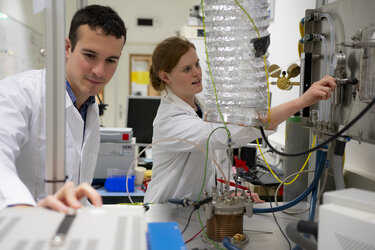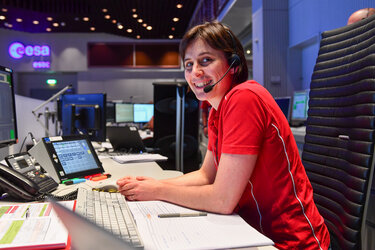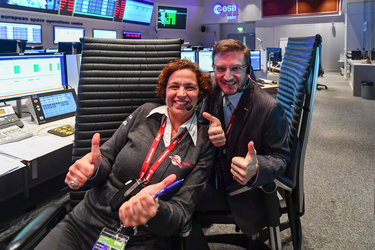Former ESA Research Fellows: Where are they now?
ESA's postdoctoral Research Fellowship Programme offers early-career scientists and engineers the possibility to carry out research in a variety of disciplines related to space science, space applications or space technology. As we launch the 2023 Space Science Research Fellowship Programme, we are inviting former Research Fellows to share their experience at ESA. This month we are interviewing Japheth Yates who was an ESA Research Fellow in the Directorate of Science and is now a lead computational engineer at Arrival, an electric vehicle startup.

Where and in which role are you working today?
I am responsible for a wide range of tasks, including software development, data engineering, data science and, on occasion, running engineering simulations such as computational fluid dynamics. This means that my day-to-day work is highly diverse and can involve anything from analysing data to developing physics-based models to creating REST clients and databases. I enjoy the challenge of working on a variety of projects and the opportunity to use my skills in a variety of ways.
What were you doing before joining ESA as Research Fellow? Where did you hear about the vacancy for a Research Fellowship at ESA?
Before joining ESA, I was a postdoctoral research associate at Imperial College London, where I investigated periodic phenomena in Saturn's magnetic environment as a member of the Cassini MAG team. I also taught undergraduate physicists how to use Python. I learned about ESA Research Fellowships through colleagues at Imperial who have interacted regularly with ESA due to their involvement in the Juice mission, as well as from a few good friends who had previously held ESA fellowships.
What did you work on during your fellowship at ESA? Do you have a most memorable moment from this period?
The main focus of my fellowship was the coupling between Jupiter's upper atmosphere (thermosphere and ionosphere), its magnetosphere and the solar wind. I dedicated a lot of time to developing my coupled model from a two-dimensional atmosphere and one-dimensional magnetosphere to a three-dimensional atmosphere and a pseudo-two-dimensional magnetosphere. I also contributed to the planning and operations of the Juice mission and ESA's Data Analysis and Statistics journal club and workshops. There are too many memorable moments to count, but some of the highlights include getting private tours of the Erasmus Innovation Centre at ESTEC and demo-ing the Mars VR simulator at ESAC. There are many more memorable moments that I'd be happy to talk about over a drink or two!

Where did your path lead to after your Research Fellow experience?
As my time at ESA was coming to an end, I realised that there were things I wanted in a career that academia couldn't provide. Fortunately, Arrival reached out to me around the same time, and after a few discussions, I decided to join them in London after finishing my term at ESA.
What was the most valuable takeaway from your experience at ESA?
This is easy! The most valuable things I gained from my time at ESA were the people I met and the lifelong friendships that I formed.
Is there anything else you would like to tell early career researchers who are planning to apply for Research Fellowships at ESA?
I would highly recommend it! ESA is a great place to work, with ample opportunities to network with other scientists in your field and beyond. Many scientists travel to ESA regularly for various mission and science meetings, which provides a great opportunity to start collaborations. Additionally, ESA fellows have 20% of their time available for non-research work, such as helping with mission planning and operations or any other function that you might be interested in.
It is important to choose a fellowship that is guided by your interests, so make sure that you are doing something that you care about and can have fun doing. I would also recommend using your fellowship to both learn new skills and further develop the ones you already have. Wherever your journey takes you after your fellowship, the skills and experience from ESA will be useful.

Call for applications
Research Fellowships in Space Science specifically offer the opportunity to contribute to ESA's endeavour to explore our Solar System and the Universe in the fields of heliophysics, planetary science, astrophysics and fundamental physics. The call for applications will open in August 2023. More information can be found here.
Life at ESA
ESA is proud to offer its employees a stimulating and inspiring work environment that is complemented by myriad on-site services and facilities that make their ESA experience outside of work equally as rewarding.
Learn more about life at ESA.















 Germany
Germany
 Austria
Austria
 Belgium
Belgium
 Denmark
Denmark
 Spain
Spain
 Estonia
Estonia
 Finland
Finland
 France
France
 Greece
Greece
 Hungary
Hungary
 Ireland
Ireland
 Italy
Italy
 Luxembourg
Luxembourg
 Norway
Norway
 The Netherlands
The Netherlands
 Poland
Poland
 Portugal
Portugal
 Czechia
Czechia
 Romania
Romania
 United Kingdom
United Kingdom
 Slovenia
Slovenia
 Sweden
Sweden
 Switzerland
Switzerland






























